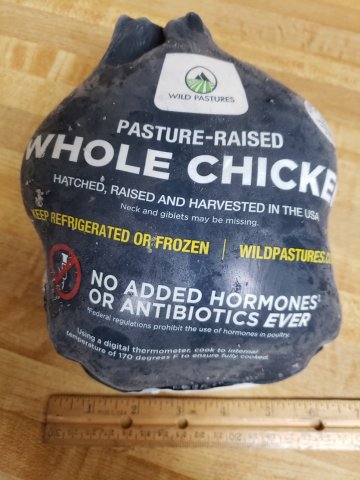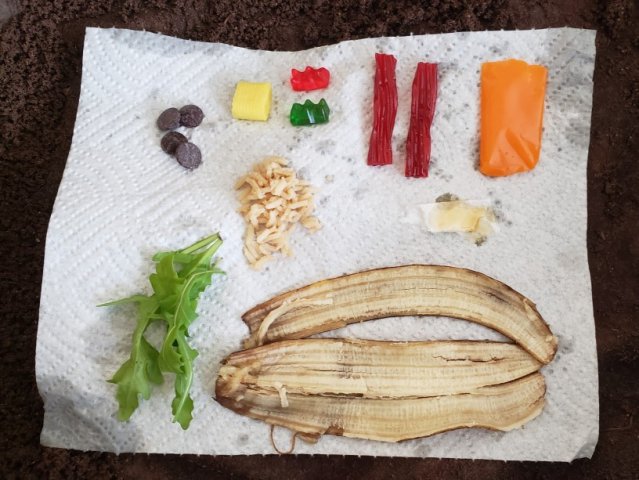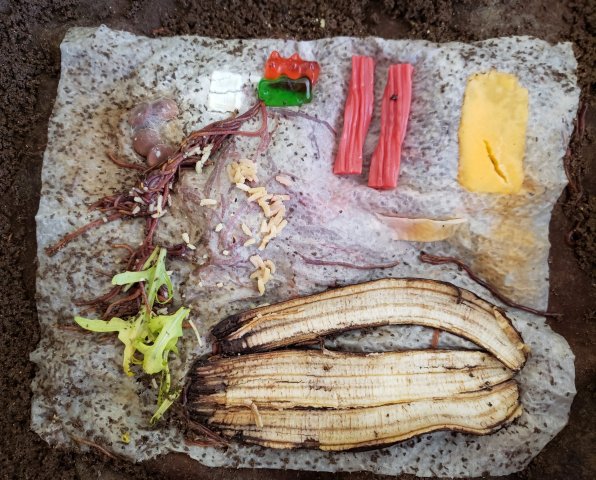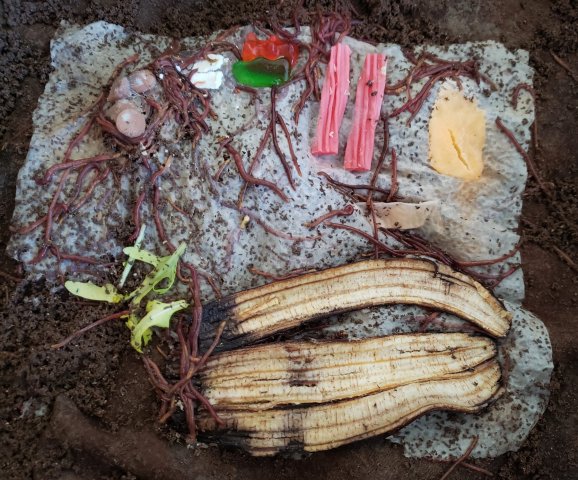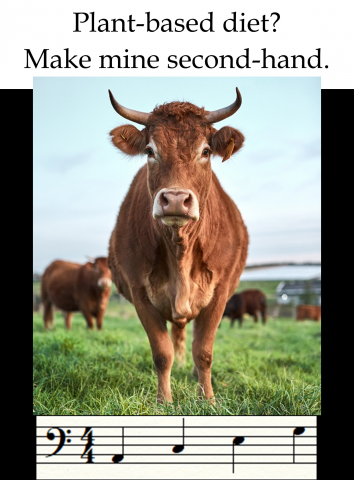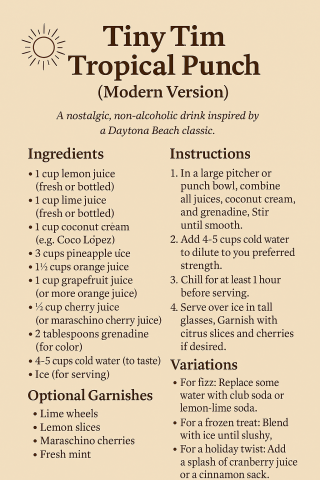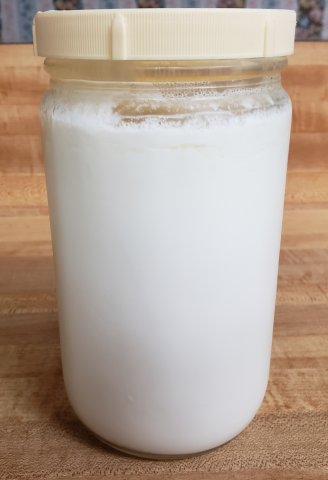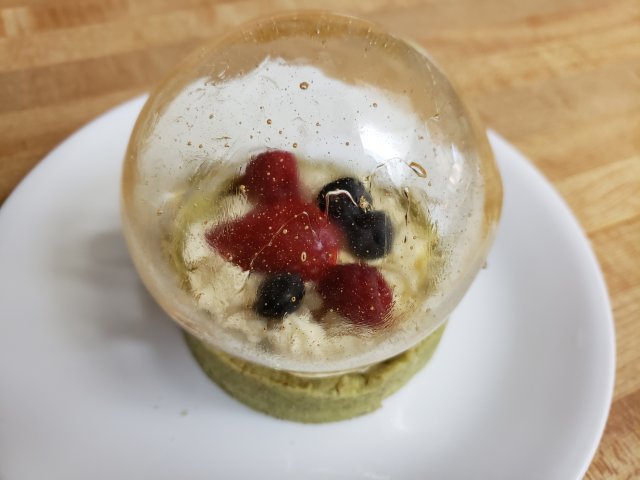This Thanksgiving we did not have turkey. A guest provided a ham, so a turkey would have been 'way too much food. So I roasted a mini-turkey, aka a Wild Pastures whole chicken.
I have to say, it was really, really good. I'm more than ever convinced that mass-produced food is bred for lack of flavor. The day before, I had rubbed it all over, lightly with honey and fresh lemon juice, then heavily with a dry mixture of salt, black pepper, and "Alliums Plus," which is my homemade ground spice blend of various alliums, green peppercorns, and celery seed. I filled the (small) cavity with peeled and lightly smashed garlic cloves, a couple of large springs of rosemary, and half a lemon, and let it dry brine (uncovered) overnight in the refrigerator. The seasoning was light enough to let the chicken flavor shine.
Almost as good is what happened after the meal was over.
I've tried off and on for years to make my own broth/stock, with minimal success. Oh, I would succeed in creating broth, but it would turn out to be no better than I could get at the grocery store for a whole lot less work. But this time was different.
After our Thanksgiving meal, I dug out the crockpot and put in the chicken carcass (which fit perfectly) along with a collection of onion skins and leg and thigh bones from previous meals of Wild Pastures chicken parts, which I had collected in the freezer. I filled the pot with water and let it simmer until the following day. I added no seasoning additional to whatever came with the carcass (minus the half lemon, which I removed).
After removing all the solid material and straining the liquid, what to my wondering eyes should appear was a hearty, delicious stock. You can tell how much good came out of the bones by the way it jiggled when cooled.
Now I am again excited about making stock. It was a small batch, which helped, as did keeping it simple, but I'm looking forward to, rather than dreading, the next opportunity.
As I wrote in Let the Worms Decide, I decided to do my own experiment on what our composting worms think of junk food.
I began the experiment with the worms "hungry"; I had let the available food dwindle 'way down in hopes of increasing their willingness to accept my offerings. I placed a clean paper towel on top of the moisture mat for greater visibility for the camera; normally their food goes under the mat, but I knew the clever little creatures would find it. From left to right, top to bottom: chocolate chips (60% cacao), a Starburst candy, two gummy bears, two Hallowe'en-sized Twizzlers (strawberry), an Airheads candy, brown rice, a piece of paper towel soaked with local, raw honey, some arugula, and a banana skin.
Four days later, the chocolate chips had apparently begun to mold, and the Starburst was completely covered in it. The other candy had softened and faded, but was untouched. The rice was very popular, but it's hard to tell what they thought of the honey. The arugula showed a small amount of interest, and there was some activity at one end of the banana skin.
After seven days I took pity on the worms and ended the experiment so I could give them a larger quantity of food I know they like. As you can see, there was a lot more worm activity. The rice was completely gone, and there had obviously been a lot of action around the arugula and the end of the banana (note all the worm castings). The chocolate showed a reasonable amount of interest and there were a number of worms around the candy—but they may have been munching on the paper towel. The Airhead seems to have been totally ignored.
It's hard to draw any firm conclusions. The worms can't really eat many items until the bugs and microfauna have done their pre-processing work, and some foods may take longer than others. I don't know why the arugula went so slowly; usually greens go quickly, but perhaps arugula is too "spicy" for the worms—I know they don't like the strong-flavored lemon balm.
I would have thought that the candy, being mostly sugar, should have been easy for them to handle. But I was wrong. According to my Brave browser's AI,
Red wiggler worms should not eat candy. Candy is high in sugar and often contains oils, artificial ingredients, and other additives that can harm the worms or disrupt the balance of the composting environment. While red wigglers can consume a variety of organic matter, including fruits and vegetables, they should not be fed processed foods like candy, cookies, or cake, as these can lead to poor bin conditions and attract pests.
So there you go. Ultra-processed foods are bad for worms, and probably for people, too. Then again, chocolate is bad for dogs, they say, and good for people (in limited quantities), so make your own decisions.
"Let the Worms Decide" is an Epoch Times article that caught my eye first because of the author, Joel Salatin, and secondly because I knew what kind of worms he was talking about. We've been vermicomposting since 2009, and I know a little bit about what our worms will and will not eat.
Salatin begins with a story from a middle school program he visited in California, where students worked on a small farm half a day each week.
They had a worm box about 8 feet by 3 feet by 3 feet. Imagine an oversized coffin. If you want to see children get excited, show them a worm box. It’s mesmerizing with all the slithering, slimy worm activity....
One week, the farmers assigned homework: “Bring food on Monday.” The students dutifully brought some food: Twizzlers, Gummy Bears, Froot Loops—you get the idea. They placed their “food” in one end of the worm box. The farm ladies put different items in the other end: an apple, a pork chop, and a glob of yogurt, among other things. The following week, the students, eager to see what had transpired, ran to the box and opened it.
They pulled out their Gummy Bears, Twizzlers, and Froot Loops—untouched. When they tried to find the food items that the farmers had placed at the other end, all that food was gone. The day’s lesson was obvious: “Why would you want to eat something worms won’t even eat?” I'll bet a lot of young people made some different eating decisions that day.
Tongue not totally in cheek, Salatin proposes turning our expensive—and too-easily corrupted—food safety testing over to composting worms.
I’ve known and worked with many worm farmers over the years who explain how sensitive their “livestock” is to unacceptable items placed in their boxes. If they like the substance, they devour it readily. If they don’t, they move away and give it a wide berth.
If worms are that decisive and timely to determine healthy versus unhealthy things in their environment, why not ask them to share their preferences with all of us?
Worms don’t vote, don’t listen to lobbyists, don’t invest in Wall Street, or watch ads. They are about as objective a researcher as you could ever want. Goodness, they aren’t even swayed by money.
Here’s my idea: why not get a small plot of land—perhaps 5 acres—and set up 100 worm boxes? Everything Americans apply to the soil or put in our mouths would undergo the worm test for a week. What the worms ate would get a green light. What the worms didn’t eat would get a red light.
We could hire a couple of college students to run the program. If glyphosate is really innocuous, let’s see if the worms like it. If Coca-Cola is really nutritious, let’s see if the worms like it. Pour it in and see if they want to come to that area, or if they avoid it like the plague. If Red Dye 29 is a wonderful food additive, or monosodium glutamate (MSG), put them in the worm bed and let the worms vote.
Based on my experience, I see a few problems with this scenario, as I'm sure Salatin himself does. Worms will eat (and detoxify) some really nasty things, given enough time for their cohabiting microorganisms to break them down. The farmers who sold us our system have huge vermiculture setups in which they say the worms will devour battery acid in small quantities. Just because you can convince a worm to eat something, that doesn't mean I want it in my food. But the one-week test would probably take care of that problem. Maybe the worms will eventually eat something, if they get hungry enough, but they definitely have their favorites and, like a small child at the dinner table, will go for the good stuff first.
That same small child may reject his beets despite their certified goodness, and my worms will reject things I find great. Like homegrown, organic lemon balm. Or citrus peels. (Granted, I never tried them on the chocolate-covered variety.) Some worms don't like broccoli; fortunately, ours eat it right up. So it's not a foolproof system.
That said, Salatin makes an important point: If something we're doing causes natural systems to thrive, that could be a clue that we may be going in the right direction. On the other hand, a failing system is a red warning light that should give us pause.
Stay tuned for the results of my own experiment. We have leftover Hallowe'en candy, including the above-mentioned Twizzlers. I plan to make an offering to the worms and see what they have to say.
Permalink | Read 464 times | Comments (1)
Category Education: [first] [previous] [next] [newest] Health: [first] [previous] [next] [newest] Politics: [first] [previous] [next] [newest] Food: [first] [previous] [next] [newest] Conservationist Living: [first] [previous] [next] [newest]
When was the last time you were threatened by a gang of thugs wielding spiralizers? Apparently that is a danger in the United Kingdom. Either that, or the chefs' union is lobbying hard to keep teens from trying to break into their business. Or possibly Bob the Tomato and Larry the Cucumber have more power than I thought.
This story, posted by a woman in the UK, popped up on Facebook, and I quickly copied the text. I regret not catching the image, too, as that would have shown how small, unpowered, and insignificant the device in question is. But you'll get the idea.
I know many things are going nuts in the UK, though I don't know anyone personally who can vouch for them. But the following story, if it is true—and at least it has the ring of truth and not clickbait—shows that at least in one area they are even crazier than America, which is saying a lot.
What I want to know is… When did the world go completely mad? Did I miss it?
Let me explain…
Yesterday, I was shopping in a well-known store with a red and white logo With my 10-year-old son.
Among the impulse purchases were a red nose day Tshirt for my son, a gift for the teacher and this lovely spiralizer/vegetable grater for me.
My helpful son unloaded the items onto the checkout desk while I removed my purse from my handbag, at which point the young lady on the desk said “I’m sorry, I can’t sell you that.”
She proceeded to explain that as the spiralizer was not to be sold to anyone under 18 and my son was the one who placed it on the counter, it was deemed that the vegetable cutting device was for him.
Bewildered, I said ”but it’s a spiralizer, and quite obviously it’s for me.”
She refused the sale.
I asked if I could purchase it separately.
She refused the sale.
I asked if I could speak to the manager and they could make allowances for such an obvious fault with the rules.
The manager refused the sale.
I told the manager it would probably be a good idea to put some sort of signage up to let customers know that minors should not be unloading shopping to help their parents.
She obviously misunderstood as she pointed out the signage on the packaging that clearly says “Do not sell to under 18s”.
I left the store confused and a little perturbed and resigned myself to a lifetime of chunky vegetables in my recipes.
You can however all rest safe in the knowledge you will never be faced with a vegetable shredding 10-year-old wearing a Feathers McGraw T-shirt roaming the streets of Cumbria… all thanks to the vigilant staff of the West Cumbrian store.
You can't sell a spiralizer to a 17-year-old in the UK?
I'm assuming a much-more-potentially-dangerous kitchen knife would meet with similar restrictions. At what age are people allowed to cook on that side of the Atlantic? How about to wash dishes, which would undoubtedly include knives.
I don't remember when I started helping in the kitchen, nor when our own children did, but I know that most of our grandchildren started learning how to use kitchen knives at the age of two (well supervised, of course), and by four were reliable helpers in cutting up vegetables for a salad. I know that's early, even for America, but if David Farragut could command a ship as a pre-teen (there is some difference of opinion as to whether he was 11 or 12), surely it is a bit excessive to restrict the use of sharp objects to those 18 and older.
Permalink | Read 536 times | Comments (1)
Category Education: [first] [previous] [next] [newest] Politics: [first] [previous] [next] [newest] Children & Family Issues: [first] [previous] [next] [newest] Everyday Life: [first] [previous] [next] [newest] Food: [first] [previous] [next] [newest]
I've been watching the Cracker Barrel brouhaha with some amusement. Not that it concerns me directly: Despite having lived here for 40 years, I haven't developed a taste for Southern cooking. Except for hush puppies, fried green tomatoes, pulled pork, and Key lime pie, oh my! Unlike several of my friends, I almost never eat at Cracker Barrel. Not that that hurts the company any: Another reason I don't go there is that they're so crowded and the wait is too dang long. So I can't imagine why their CEO decided the restaurant needed to be de-Southerned. Don't mess with success.
As the Coca-Cola Company learned 40 years ago, when they decided to change the formula of their iconic product. New Coke was an instant failure, and so was New Cracker Barrel.
Which leads me to the following speculation: Did Cracker Barrel's CEO wake up one morning and ask herself, What can we do to spruce up our bottom line? How can we make more people aware of our restaurants?" And did a sly smile spread over her face as she realized the value of offending people? It's risky—that strategy bit Bud Light rather badly—but if you do it right, you can generate a big storm, make your regular clientele remember why they love your product, and get people talking about you who had never even walked across your threshold. If the reaction to your changes is bad, you can admit your mistake and backtrack—if you do it quickly enough, people will forgive you, and may even have a greater appreciation for something they had taken for granted. And if nobody really cares about your changes, you can congratulate yourself on moving the company in the direction you want to go.
People are calling those who promoted the Cracker Barrel change idiots, or worse. But I wonder. It may turn out to have been a smart move, as long as they can convince their loyal and enthusiastic customers that they've learned their lesson and didn't really mean to insult them, their tastes, their traditions, and their ancestors.
Here's an interesting look at attempts to replace farms and ranches with industrial food production facilities.
I'm not totally against efforts to use technology to create flesh; I'm quite excited about the possibility of using 3D printers to create hearts, kidneys, and other organs for those who need them. That, too, is still a far-off dream, but it sure beats re-defining death so that more organs can be harvested for transplant, as was recently suggested in the New York Times. (The link will be useless to you if, like me, you can't get into the NYT, but you can see the headline.)
The main reason I like that video is how it reveals the incredible complexities of natural life, which we take for granted until we try to mimic them. Lab-grown meat is no more likely to replicate—in taste or nutrition—a fire-grilled steak from a purely grass-fed steer than vanillin can replace a vanilla bean, or oat milk the marvellous liquid that comes from a well-tended cow.
Permalink | Read 1572 times | Comments (0)
Category Health: [first] [previous] [next] [newest] Food: [first] [previous] [next] [newest] Conservationist Living: [first] [previous] [next] [newest] Here I Stand: [first] [previous] [next] [newest]
For another of the numerous projects that overflow my cup of time, I was perusing my post of almost a decade ago, A Dickens of a Drink, in which I lament the loss of a favorite drink from the old Kay's Coach House restaurant in Daytona Beach. Although the kindly bartender responded to our family's enthusiasm and my youthful pleas by writing out the recipe, I was never able to acquire many of the ingredients. Even today, with Google and the vast resources of the Internet to help, a search for "Bartender's Coconut Mix" brings up only a sponsored handful of coconut liqueurs—and my own post. Cherry juice was not something available in grocery stores back then, and I'd never heard of grenadine.
As I have occasionally been doing recently, as part of my AI Adventures, I asked Copilot to analyze the text of my old post. As part of its response, it asked, "Would you like help modernizing the Tiny Tim recipe for today’s ingredients?" What an idea! Well, nothing ventured, nothing gained, and here's what it came up with (click image to enlarge):
I am looking forward to trying this out on a smaller scale. I'm sure I can find all the ingredients. A quick reflection makes me question some of the proportions, but it's a great place to start. Maybe that's what an AI tool should be all about: Begin with a well-researched base, then add the human element (experiment and taste) to make it real.
Permalink | Read 2274 times | Comments (1)
Category Children & Family Issues: [first] [previous] [next] [newest] Everyday Life: [first] [previous] [next] [newest] Food: [first] [previous] [next] [newest] AI Adventures: [first] [previous] [next] [newest]
This is my dream garden. It's not an achievable dream at this point in my life, and even if I were much younger, there's a lot more to creating a system like this than he discusses. It's not so much a garden as a very small farm (albeit this one is in suburban Long Island), and requires farm-level work. For one thing, you can't decide to go out of town without arranging for someone to care for your plants and animals. It's like being a pet owner, only a lot more intense—you can't pack up your chickens and take them to a kennel, and neighbors who will happily feed your cat might draw the line at milking goats.
If this is ever going to be your dream, it's probably easiest to start dreaming early in life, when you're making decisions about family, employment, and home location.
Nonetheless, there's a lot of inspiration to be gained from Mike G.'s experience, especially in seeing how much he accomplished in under five years of consistently pursuring his goal, taking one step at a time, and learning along the way.
Permalink | Read 788 times | Comments (0)
Category Health: [first] [previous] [next] [newest] Food: [first] [previous] [next] [newest] Conservationist Living: [first] [previous] [next] [newest] Inspiration: [first] [previous] [next] [newest]
It was eye-opening, when we first visited Switzerland, to discover that they don't refrigerate their eggs. Nor do they get sick from that practice. Why must we refrigerate American eggs? Here's an Epoch Times article that explains why we are once again being given the short end of the gustatory and nutritional stick.
Being raised in the United States, I was startled during my first trip out of the country. I noticed that the eggs at the store were not refrigerated. How is this possible? ... I gradually came to realize that the United States is the outlier, apparently the only country in the world where eggs go from the chicken to the refrigerator, both at the store and at home.
The United States seems to be the only country in the world that requires the washing of eggs before they are sold. As a result, the outside membrane—called the cuticle—is washed away, leaving them vulnerable to outside bacteria and other sources of spoilage. That’s why they must be refrigerated. ... However, if you don’t wash away the cuticle, they can sit happily on the counter for a very long time and be ready to eat anytime.
It’s because of Big Agriculture and industrial methods of egg harvesting. They pack chickens in huge warehouses inches apart and in tight layers. The whole place is a gigantic mess because machines can’t stop the natural function of the digestive system. In essence, the place is filthy. As a result, washing the eggs is absolutely necessary to remove all the pathogenic muck.
The industry, then, lobbied the government over decades to make this a general rule, providing them with a level competitive playing field with small farmers who run much cleaner operations. ... In effect, the USDA and the FDA have adopted rules on behalf of the biggest players in the industry while forgetting about the small farmers.
Maybe in the future, Americans will have the right to raise and sell eggs without washing off the protective layer from the shells. Maybe in the future, we will stop being seemingly the one outlying country in the entire world that routinely refrigerates our chicken eggs? We shall see.
Maybe in the future we will have better access to eggs bursting with nutrition and with beautiful, deep-golden yolks that come from a natural diet that includes bugs and a variety of vegetation, not something added to a grain-based diet just to make the eggs look good.
I often hesitate to share articles from the Epoch Times, because although many of them are free to read, some people have been put off by the requirement to enter an e-mail address. I understand, and am grateful that I have an infinite supply of e-mail addresses to use—and thus to block if they start generating spam. (One of the blessings of having your own domain.) However, there are many articles worth sharing, so I'm going to start posting some of them for those who aren't turned away by the requirement for an address (assuming they are still doing that).
From Veganism to Vitalism: Why I Left Industrial Plant-Based Culture for Real Food, Real Soil, and Real Community, by Mollie Engelhart, warmed my heart for the same reasons Polyface Farms and Joel Salatin have impressed me so much. To whet your appetite, here are a few quotations from the article.
My commitment to the environment led me to start my own farm as a way to manage the food waste from my restaurants. I was the founder and executive chef of Sage Vegan Bistro, which eventually became Sage Regenerative Bistro. I wanted to close the loop—grow the food, feed the people, compost the scraps, and build healthy soil. But the deeper I got into that system, the more I began to see the cracks in the story I had believed so fully.
Living on the land and growing my own food broke me wide open. I started to realize that the version of “ethical eating” I had bought into—and helped promote—left out most of the truth.
I found myself drawn to the small farmers around me—the ones working with animals, not against them. I began visiting more of their farms, asking more questions, and slowly, inevitably, became one of them. I went from observing to participating.
When you bring animals onto the land—when cows graze, chickens scratch, and pigs root—you build an ecosystem. Nutrients cycle naturally. Soil comes alive. There’s a rhythm to it, a divine order. Every part has a role. The death of one thing nourishes the life of another. And when you participate in that cycle, it humbles you. It teaches you. It changes you.
I didn’t leave veganism because I stopped caring about animals. I left because I started caring more—about the whole picture. About ecosystems. About what happens before the almond milk hits the shelf. About the water, the soil, the labor, the waste, and the long chain of consequences that “ethical” labels so often obscure.
Regeneration isn’t just a farming practice. It’s a worldview. It means taking full responsibility—for our choices, for our impact, for our role in the cycle of life. It’s not about purity or perfection. It’s about participation. ... The way back is right beneath our feet—in the soil, in our communities, and in the relationships we build with the land and each other.
Here are some related posts, from 2009 to 2023.
- Conservationist Living
- Strange Bedfellows? Not Really
- The Omnivore's Dilemma
- Everything I Want to Do Is Illegal,
- Fruitless Fall
- The Raw Milk Revoution
- Small (Agriculture) Is Beautiful
The last is part of a speech given by Joel Salatin in 2022, which I reproduce here:
Are you listeining, Robert F. Kennedy, Jr.? This could go a long way toward making American healthy again.
I believe our new Secretary of Health and Human Services is listening; at least, I have hope that progress will be made toward encouraging regenerative farming, sustainable agriculture, and food freedom in general.
Permalink | Read 1001 times | Comments (0)
Category Health: [first] [previous] [next] [newest] Food: [first] [previous] [next] [newest] Conservationist Living: [first] [previous] [next] [newest] Here I Stand: [first] [previous] [next] [newest]
I have observed something interesting about buying eggs these days.
The painful increase in the price of eggs is directly driven by the mass-slaughter of chickens, which I'm certain will turn out to have been both useless and harmful to our country's economy, agriculture, and citizens. Much as our COVID response was, though hopefully on a lesser scale.
But perhaps some good may come of it. I've noticed that on our grocery shelves, the "better" eggs—the ones labelled local, organic, cage-free, pastured, and other such indications of (relatively) small operations—are flying off the shelves. I believe this is less because American shoppers have suddenly become more interested in better farming practices, but because the prices are lower. Why would that be? Why would the higher-end eggs actually cost less than those that are factory-farmed? Is this a temporary glitch in the system, or have farms with more humane practices been significantly less impacted by the current panic?
I have two hopes for good things that could happen in response:
- Federal, state, and local governments will recognize the value of healthier, smaller, farming practices, and stop putting onerous regulations on them. Regulatory burdens that are necessary for industrial-style agriculture are irrelevant to small and local farms, and are killing them off—to the benefit, of course, of said industrial agriculture, as it leaves consumers with no choice but to buy mass-produced food. If we truly value America's health, promoting food freedom would be a great start.
- One benefit that came out of the COVID shutdown debacle was that millions of families were introduced to the joys of home education who had never before considered it. I'm hoping that being forced by economics to sample better eggs will encourage more Americans to appreciate the kind of eggs that Europeans take for granted. And maybe over-zealous homeowners associations will start recognizing the value of backyard chickens!
I have been making homemade yogurt off and on, using a couple of different yogurt makers, for five decades. Mostly off, because good yogurt is readily available, and it was just so much easier to buy it at the store.
Recently, however, I've fallen into a system that works well for me. And all because my Anova Precision Oven, which we bought for other purposes (sous vide, bread baking), makes it easy to hold the milk at a fermenting-comfortable 110 degrees.
This glass jar, which I conveniently had in my cupboard, holds one quart. I fill it with milk, microwave it to 180 degrees, let it cool to 110 degrees, stir in some yogurt from the previous batch, stick it in the 110-degree oven, and forget it for eight hours or so before putting it in the refrigerator. Voilà: delicious, homemade yogurt! It tastes great, even with no added sweeteners or flavorings, but I especially like it with homemade granola, local raw honey, and fresh fruit. Now if only I had a reliable source of raw milk!
I have used the 180/110 degree settings because that's what one recipe I found specified. In the future, I plan to play around with the temperatures, which I understand changes the thickness and acidity of the end product, but I'm very happy with this as it is.
I usually use about a quarter cup of the previous yogurt batch as the starter for the new one. Recipes I've seen recommend anything from a tablespoon to a cup. I may play around with that, too, but a quarter cup works fine, and a cup sure seems excessive. Possibly the larger quantity make the process faster, but eight hours works for me.
I took my initial starter from a tub of Stonyfield Organic plain whole milk yogurt, which has been my favorite for years.
Recently, the Stonyfield yogurt was buy-one-get-one at Publix, the price at which I wouldn't hesitate to snap up a couple of quarts. This time, I wondered: should I grab some, even though I now make my own? Here are my calculations:
Publix prices:
- Publix milk: $4.79/gallon. One quart makes approximately one quart of yogurt.
- Stonyfield plain yogurt: $5.25/quart
- Yoplait plain yogurt: $3.39 (Publix yogurt was just a little less, but I forgot to write it down.)
- Stonyfield plain yogurt, BOGO: $2.63/quart
- Homemade yogurt: approximately $1.20/quart, not taking into account the electricity used, nor the value of my time; it takes very little of either.
Even at BOGO prices, making yogurt at home is a great deal. I'm so happy to have figured this out. It's amazing what a difference finding the right tool or procedure can make!
Perusing our church's bulletin for this coming Sunday, I noted the announcement of a special collection to benefit the food pantry at a local elementary school. Here's the list of the most needed items:
- canned fruit
- applesauce
- pasta sauce
- macaroni and cheese
- Pop-tarts
- cereal bars
- pudding
RFK Jr. can't take charge of our government's health priorities soon enough for me!
Permalink | Read 939 times | Comments (7)
Category Health: [first] [previous] [next] [newest] Politics: [first] [previous] [next] [newest] Children & Family Issues: [first] [previous] [next] [newest] Food: [first] [previous] [next] [newest]
Noah made us snow globe pastries from Ann Reardon's Crazy Sweet Creations cookbook. They were a lot of work, and he had to improvise in several places for equipment we didn't have. (Did you know that if you don't have a hemispherical silicone mold, you can used a water-filled balloon?) You can see Ann herself making her version on YouTube.
Sooo good! Pistachio and hazelnut crust, orange curd, cream, and the amazing sugar globes, with strawberries, blueberries, and raspberries. It's hard to pick a favorite part, but I will say that I'm a big fan of almond paste, and if you like that, you should try pistachio paste!
A friend shared this on Facebook, and I found a version I could share here. Amazing! (3.5 minutes)

